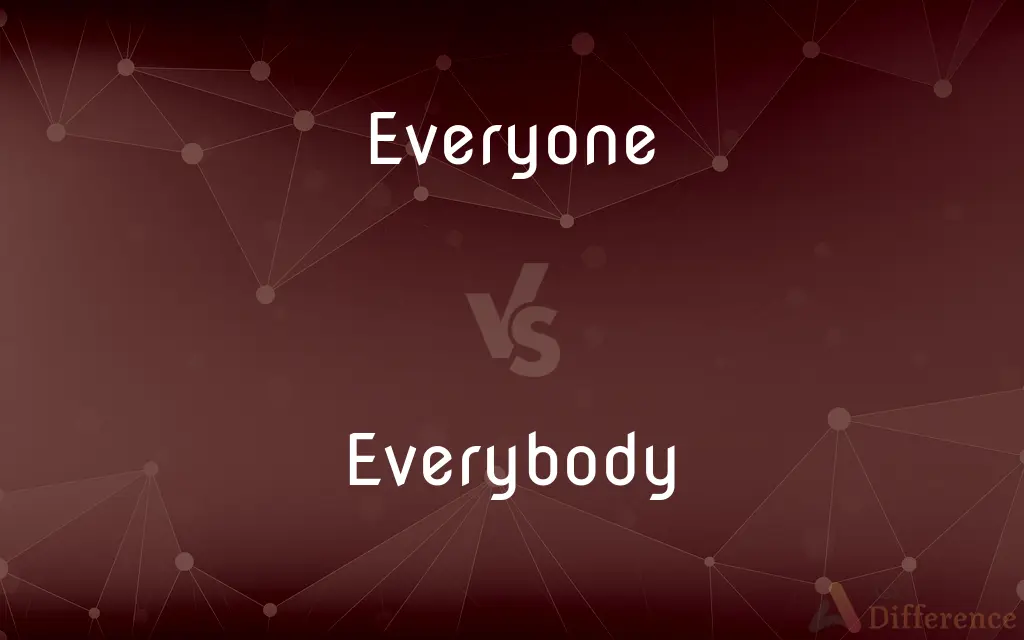Everyone vs. Everybody — What's the Difference?
By Urooj Arif & Fiza Rafique — Updated on April 15, 2024
"Everyone" and "everybody" are interchangeable pronouns meaning all persons, with "everyone" sometimes viewed as more formal than "everybody."

Difference Between Everyone and Everybody
Table of Contents
ADVERTISEMENT
Key Differences
Both "everyone" and "everybody" refer to all persons in a given group, but there are subtle nuances in their usage. "Everyone" is often considered slightly more formal than "everybody." Although this distinction is minimal, it can influence the choice of word in written or formal contexts. On the other hand, "everybody" might be preferred in casual speech or informal settings due to its slightly more colloquial tone.
While "everyone" might be used in contexts requiring a bit more formality or precision, "everybody" is frequently used where the language is more relaxed. For example, in academic writing or professional emails, "everyone" might be more commonly selected. Conversely, in everyday conversations, "everybody" can appear more frequently.
There are no grammatical rules distinguishing when to use "everyone" versus "everybody," and they are functionally identical. Each serves as a singular pronoun despite referring to a group, requiring singular verb forms (e.g., everyone is, everybody has). This grammatical agreement does not vary between the two.
The choice between these words can also reflect slight variations in tone or personal style of expression. Some speakers may consistently prefer one over the other based on their linguistic habits or the influence of regional English usages.
In literature and media, authors might choose "everyone" or "everybody" based on the character's voice or the narrative tone. "Everyone" could be used to convey a more refined character trait, whereas "everybody" might be employed to create a more laid-back or universal appeal.
ADVERTISEMENT
Comparison Chart
Formality
Slightly more formal tone.
Slightly more informal tone.
Usage Context
Often used in formal or written English.
Commonly used in informal or spoken English.
Grammatical Agreement
Requires singular verbs (e.g., everyone is).
Requires singular verbs (e.g., everybody is).
Tone
May convey a more polished or serious tone.
Often conveys a more casual or approachable tone.
Variability in Use
May be preferred by speakers who lean towards formal English.
Often chosen by speakers in casual conversations or informal writings.
Compare with Definitions
Everyone
Used to refer to all people in a group or in general.
Everyone needs to register by noon.
Everybody
Used informally to address or refer to all people present.
Everybody, please gather around.
Everyone
Indicates inclusivity in formal invitations or announcements.
Everyone is required to attend the meeting.
Everybody
Every person; all people.
Everybody loves a good surprise.
Everyone
Every person; all people.
Everyone was invited to the party.
Everybody
Common in everyday conversation.
Everybody in the neighborhood comes here.
Everyone
Sometimes implies a sense of collective responsibility.
Everyone has a part to play in conserving water.
Everybody
Implies inclusivity in a casual or familiar manner.
Everybody's invited to the barbecue this weekend.
Everyone
Used in contexts where generalization is needed.
Everyone knows the importance of exercise.
Everybody
Often used when expressing opinions or general statements.
Everybody needs a break now and then.
Everyone
Every person.
Everybody
All people.
Everyone
Everybody; - commonly separated, every one.
Everybody
Every person.
Common Curiosities
Is the use of "everyone" vs. "everybody" influenced by British or American English?
The choice is more about formality and tone rather than British or American English preferences, though individual usage patterns may vary.
Is there any situation where one should definitely use "everyone" over "everybody"?
While both are usually acceptable, "everyone" might be preferred in formal writing or professional contexts.
Can "everyone" and "everybody" be used to address a specific group of people?
Yes, they can address specific groups where the context defines who is included.
Is there any difference in pronunciation between "everyone" and "everybody"?
No, there is no significant difference in pronunciation.
Can "everyone" or "everybody" be plural in some contexts?
No, grammatically they are always singular, even though they refer to a group.
How should I decide which to use in my writing?
Consider the formality of the document and your personal style; "everyone" for more formal or serious tones, "everybody" for casual or friendly tones.
Are "everyone" and "everybody" completely interchangeable?
Yes, they can be used interchangeably without altering the meaning of a sentence.
Do "everyone" and "everybody" refer only to human beings?
Yes, both pronouns exclusively refer to human beings in a group.
What verb agreement do "everyone" and "everybody" require?
Both require singular verb agreement, such as "is" or "has."
Can using "everyone" or "everybody" affect the tone of my message?
Yes, choosing "everyone" might give a slightly more formal tone, while "everybody" might make the message feel more relaxed.
How can I remember which to use?
Remember that "everyone" sounds slightly more formal and might be more appropriate for written or professional settings, while "everybody" feels more informal and conversational.
Are there any famous quotes using "everyone" or "everybody"?
Yes, one example is: "Everyone is a genius. But if you judge a fish by its ability to climb a tree, it will live its whole life believing that it is stupid." – Albert Einstein.
What is the origin of the words "everyone" and "everybody"?
Both words are compounds of "every" and "one" or "body," reflecting the idea of "all persons" and have been in use since Middle English.
What are synonyms for "everyone" and "everybody"?
"All," "each person," and "every person" can be considered synonyms.
Do "everyone" and "everybody" have the same emotional connotation?
They generally carry the same emotional weight, although "everybody" might feel slightly more inclusive and friendly.
Share Your Discovery

Previous Comparison
Holiday vs. Eve
Next Comparison
Canal vs. StreamAuthor Spotlight
Written by
Urooj ArifUrooj is a skilled content writer at Ask Difference, known for her exceptional ability to simplify complex topics into engaging and informative content. With a passion for research and a flair for clear, concise writing, she consistently delivers articles that resonate with our diverse audience.
Co-written by
Fiza RafiqueFiza Rafique is a skilled content writer at AskDifference.com, where she meticulously refines and enhances written pieces. Drawing from her vast editorial expertise, Fiza ensures clarity, accuracy, and precision in every article. Passionate about language, she continually seeks to elevate the quality of content for readers worldwide.














































